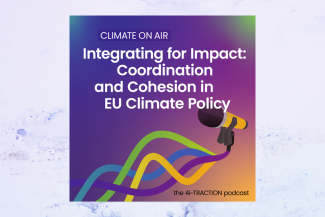
Podcast series: Episode #5- Integrating for Impact: Coordination and Cohesion in EU Climate Policy
What is climate policy Integration?
The cross-cutting nature of climate change requires that climate policies are aligned across all sectors and, move away from incremental policymaking practices - often characterized by 'silo' thinking. This ensures coherent consideration of climate policy objectives and targets, fostering synergies and complementarities among policies. To achieve this so-called mainstreaming, all branches of government and institutions must coordinate at all stages of the policymaking process.
How do EU legal and governance frameworks contribute to climate policy integration?
In this 5th episode of CLIMATE ON AIR, we discuss with climate policy integration experts Kati Kulovesi (University of Eastern Finland, UEF) and Sebastian Oberthür (Vrije Universiteit Brussels, VUB) about the essential role of climate policy integration on the path to the EU's climate neutrality transition. We delve deeper into the EU's legal and governance aspects that are necessary for successful climate policy integration, highlighting the significant role of the European Climate Law in setting a legally binding climate neutrality target, alongside the EU Governance Regulation. Our experts emphasize the importance of institutional capacity and public acceptance. They provide insights into the challenges of achieving effective policy Integration as well as recommendations for future policymaking.
Tune in and enjoy the conversation!
Listen now!
The podcast is produced by Ecologic Institute and Eastern University of Finland and is available online on the following streaming platforms: Spotify | Apple Podcasts | Deezer | Amazon Music and You Tube
Become part of the community!
Sign up for our mailing list and stay up to date on upcoming shows and news around this podcast series.
The podcast is part of the 4i-TRACTION project, financed by the European Union's Horizon 2020 research and innovation programme funded under grant agreement No. 1011003884.
Related links
- Episode overview: CLIMATE ON AIR – Discussing the Future of EU Climate Policy
- Moore, Brendan, Sebastian Oberthür, Matthias Duwe, Nora Kögel, Nick Evans, Ingmar von Homeyer, Kati Kulovesi, Bettina Kampman, Anuschka Hilke, Maiju Mähönen, and Katri Varis (2023): Transformative procedural climate governance: Mechanisms, functions, and assessment criteria. 4i-TRACTION Deliverable 5.1. Vrije Universiteit Brussel; Brussels.: https://www.4i-traction.eu/outputs/transformative-procedural-climate-governance-mechanisms-functions-and-assessment-criteria
- https://www.4i-traction.eu/outputs/transformative-procedural-climate-governance-mechanisms-functions-and-assessment-criteria
- Kulovesi, K., Oberthür, S., Van Asselt, H., & Savaresi, A. (2024). The European Climate Law: Strengthening EU Procedural Climate Governance? Journal of Environmental Law, eqad034. https://doi.org/10.1093/jel/eqad034
- Faber, R., Kocher, D., Duwe, M. (2024): Fostering transformative climate governance? The potential of multilevel climate and energy dialogues. A criteria-based assessment of Member States’ reports under Article 11 of the Governance Regulation. Ecologic Institute; Berlin. https://www.4i-traction.eu/outputs/fostering-transformative-climate-governance-potential-multilevel-climate-and-energy
- EU Governance Regulation: https://eur-lex.europa.eu/legal-content/EN/TXT/PDF/?uri=CELEX%3A32018R1999
- EU Climate Law: https://eur-lex.europa.eu/legal-content/EN/TXT/PDF/?uri=CELEX:32021R1119